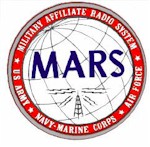|
|
Barry Morris Goldwater USAF MARS Major General USAFR 1 Jan 1909 - 29 May 1998 |
|
|
K7UGA AFA7UGA & AGA8BG |
|
Click to enlarge |
|
Barry was a New Year Baby born in Phoenix, Maricopa County, Arizona Territory on January 1, 1909. Heir to a small department store fortune, in 1922 at age 13 he was licensed as amateur station 6BPI. In 1929 after a year at the University of Arizona at Tucson, Barry took over the reins of the family mercantile business after his father died. Sensing the oncoming war, Barry joined the US Army Air Corps in August 1941 and was commissioned a Second Lieutenant. He served in the Asiatic Theater being promoted to Lieutenant Colonel by the time he left the Regular Army Air Corps in November 1945 with his pilot rating. He spent time from 1945 until 1952 forming and organizing the Arizona National Guard. By 1959 he was a Brigadier General in the United States Air Force Reserves and was promoted to Major General in 1962. He also served on the city council of Phoenix from 1949-1952. In 1952 he was elected as a Republican to the United States Senate and served until January 3, 1965. He was the unsuccessful Republican Presidential candidate in 1964. He was again elected to the United States Senate in 1968, serving from January 3, 1969, to January 3, 1987; he did not seek reelection in 1986. Barry served a total of five terms (30 years) in the US Senate. Throughout his life Barry was an enthusiastic ham operator. As a member of Air Force MARS his station K7UGA/AFA7UGA was manned 24 hours a day during the Vietnam war, either by himself or other amateurs he selected when he was away. Many stand-in operators experienced the thrill of operating the magnificent rigs at K7UGA/AFA7UGA. The station served GI's in Vietnam and around the world. Barry operated at every opportunity completing phone patches for all servicemen. Generally all calls that passed through his station were free, paid for by Barry. During the Vietnam War he handled hundreds of thousands of phone patches some he operated as aeronautical mobile while piloting his plane. Barry used amateur radio as a way to relax and unwind, even to the point of borrowing equipment while at the GOP convention in 1964 and making hundreds of contacts. Goldwater was also a member of the Veteran Wireless Operators Association and was presented the Marconi Gold Medal by them in 1968. In 1972 he became their Honorary President until his death in 1998. In 1982 the Goldwater-Wirth Bill was passed by Congress allowing the birth of the Volunteer Examiner Coordinator (VEC) program among other forward looking practices. The ARRL established a $5000 Scholarship to Honor Barry Goldwater, K7UGA in 1983 stating he was Amateur radio's "governmental protector and advocate." Upon his retirement, the United States Senate named the Barry Goldwater Scholarship in his honor. He was also awarded the Presidential Medal of Freedom on March 12, 1986. Although a political hard hitting conservative, Barry was known as the most congenial man in the Senate. A New York Times article once stated "Part of the reason for such fraternal good will was that Mr. Goldwater saw politics as a debate over ideas, not a blood sport for power. The other reason was that all sides knew he was one of those rare creatures on Capital Hill who talked straight." Barry believed in and supported individual rights, his whole stance could be easily summed in his respect of individual freedom, and belief that a smaller government is a better government. He is often quoted as saying "A government that is big enough to give you all you want is big enough to take it all away." Whatever our politics, what we as both veterans and hams should know and remember is that he cared for us and looked after us, he was one of us. |
Uno Ab Alto



